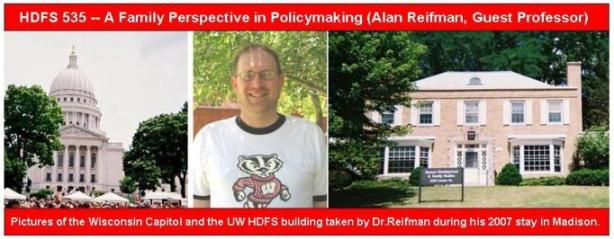Today, we will cover the basics of the legal system, including both the federal and state court systems. This is important because many of the rights to establish and engage in intimate conduct in one's relationships have been established through court challenges to legislation that had restricted personal behavior.
***
Here are some updates on our upcoming visit to Representative Berceau's office in the state capitol, Thursday at 2:00. We should go straight to her office, which is Room 208 North (if you stand in the rotunda, under the big dome, you should see signs by one of the sets of staircases that say "North Gallery"). The 200-level offices are two floors above the ground level.
As far as bus travel, we should be able to catch one of the following trips from the corner of Johnson and Charter to the capitol (as taken from the bus system's trip planner):
Route(s) Depart Arrive
19 --- 1:21p --- 1:30p
02 --- 1:26p --- 1:35p
13 --- 1:51p --- 1:57p
Subscribe to:
Post Comments (Atom)


4 comments:
I just wanted to say that I think the decision to ban birth control in Conneticut was ridiculous. I think that Griswald and Douglas approached the case in a good way. I think it is unconstitutional to deny citizens that right on the basis of privacy.
I also think it was an bizarre decision, especially considering the statute allowing abortion, which Dr. Reifman pointed out. I'd be interested in finding out what circumstances made abortion legal considering the inconsistency of privacy rights afforded to citizens.
Just to clarify the above comments, the timeline of the major U.S. Supreme Court privacy cases was:
1965 -- Griswold v. Connecticut, striking down the state's ban on contraception
1973 -- Roe v. Wade, striking down the Texas law (and by extension, other similar laws around the country) that prohibited abortion
1986 -- Bowers v. Hardwick, finding that Georgia's ban on certain types of sexual conduct ("sodomy") was constitutional and could remain in place
2003 -- Lawrence v. Texas, reversing the Court's earlier ruling in Bowers; now saying that there is a constitutional privacy right to intimate sexual behavior among consenting adults
What I said, in lecture, that I thought was bizarre was the following. Given that the Court, in Roe v. Wade, had acknowledged a privacy right to an abortion (which many people would consider to be a momentous personal and medical event and which some people even consider murder), how could the Court then come back later and say that the presumably less momentous event of engaging in certain sexual conduct is NOT protected by a right to privacy?
Good comments, keep 'em coming!
Dr. Reifman
I agree, the courts sure does contradict itself. I think that privacy should apply both to abortion and sexual conduct. In my opinion it's riduculous that the court only apply privacy rights to one thing and not the other.
Post a Comment